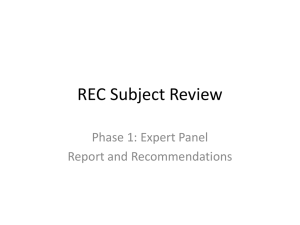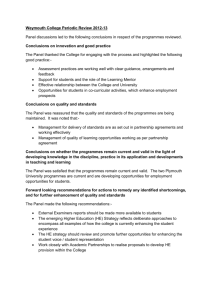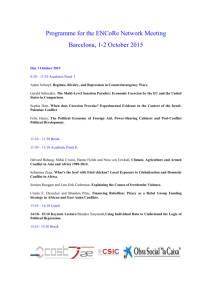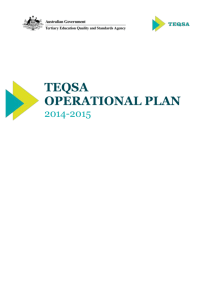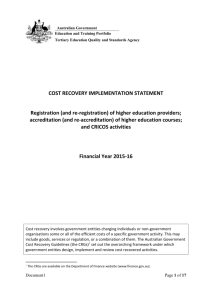Communique Number 3 – September 2012
advertisement
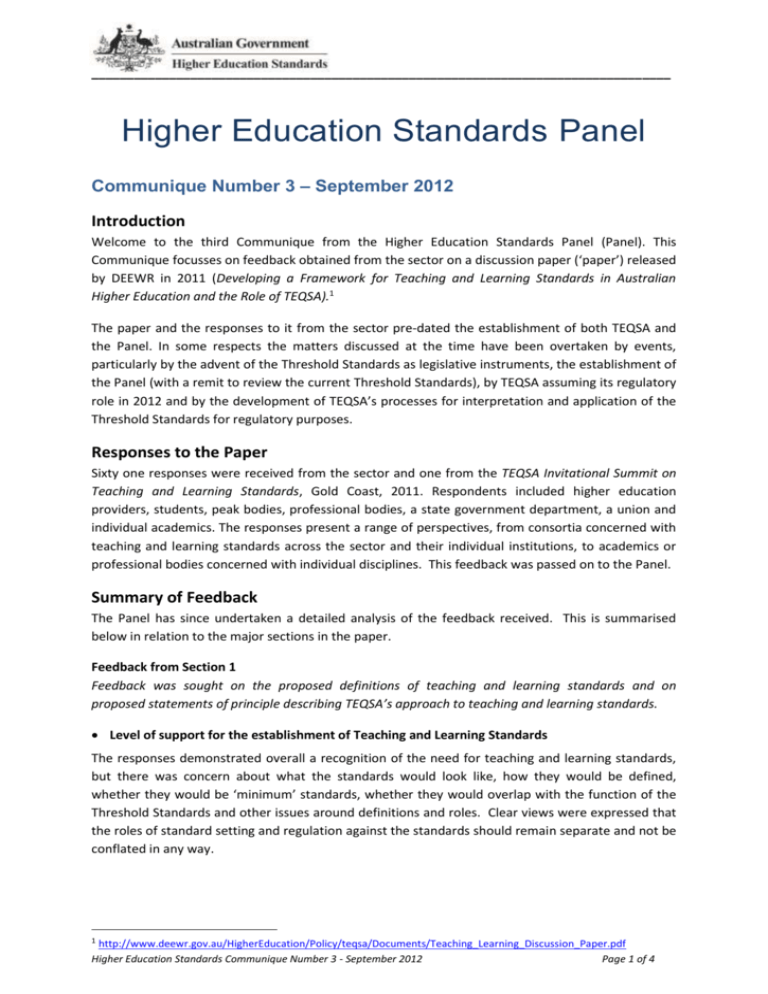
__________________________________________________________________________________ Higher Education Standards Panel Communique Number 3 – September 2012 Introduction Welcome to the third Communique from the Higher Education Standards Panel (Panel). This Communique focusses on feedback obtained from the sector on a discussion paper (‘paper’) released by DEEWR in 2011 (Developing a Framework for Teaching and Learning Standards in Australian Higher Education and the Role of TEQSA).1 The paper and the responses to it from the sector pre-dated the establishment of both TEQSA and the Panel. In some respects the matters discussed at the time have been overtaken by events, particularly by the advent of the Threshold Standards as legislative instruments, the establishment of the Panel (with a remit to review the current Threshold Standards), by TEQSA assuming its regulatory role in 2012 and by the development of TEQSA’s processes for interpretation and application of the Threshold Standards for regulatory purposes. Responses to the Paper Sixty one responses were received from the sector and one from the TEQSA Invitational Summit on Teaching and Learning Standards, Gold Coast, 2011. Respondents included higher education providers, students, peak bodies, professional bodies, a state government department, a union and individual academics. The responses present a range of perspectives, from consortia concerned with teaching and learning standards across the sector and their individual institutions, to academics or professional bodies concerned with individual disciplines. This feedback was passed on to the Panel. Summary of Feedback The Panel has since undertaken a detailed analysis of the feedback received. This is summarised below in relation to the major sections in the paper. Feedback from Section 1 Feedback was sought on the proposed definitions of teaching and learning standards and on proposed statements of principle describing TEQSA’s approach to teaching and learning standards. Level of support for the establishment of Teaching and Learning Standards The responses demonstrated overall a recognition of the need for teaching and learning standards, but there was concern about what the standards would look like, how they would be defined, whether they would be ‘minimum’ standards, whether they would overlap with the function of the Threshold Standards and other issues around definitions and roles. Clear views were expressed that the roles of standard setting and regulation against the standards should remain separate and not be conflated in any way. 1 http://www.deewr.gov.au/HigherEducation/Policy/teqsa/Documents/Teaching_Learning_Discussion_Paper.pdf Higher Education Standards Communique Number 3 - September 2012 Page 1 of 4 Respondents were concerned about having sufficient time for consultation. There was a prevailing view that rather than rush their development, it is more important to ‘get the standards right’. A number of providers, peak/professional bodies had already developed, or were in the process of developing, their own standards and were keen to have their models considered in the development process, either as a model for the national teaching and learning standards or incorporated into the standards for a specific discipline. Concerns about potential loss of autonomy and decreased opportunities for diversity and innovation through ‘standardisation’ of teaching and learning were also expressed. There was general agreement for the move from the former ‘fit-for-purpose’ model to the establishment of standards. There was also a good deal of agreement for distinctions being drawn between teaching standards and learning standards. The establishment of sub-domains for teaching and learning standards was seen as sensible and appropriate and that the distinctions between them (e.g. teaching standards seen mainly as process/delivery standards and learning standards as output/ outcome standards) provide a useful conceptual framework. There was, however, some concern that the dynamic and necessary interdependence between teaching and learning may be lost or obscured by defining these standards as distinct and separate. One challenge identified for the creation of standards is that both teaching and learning standards must define essential aspects of teaching and learning that all higher education providers should achieve, while still providing a framework against which higher education providers can monitor their own levels of achievement. Respondents noted a number of voices and perspectives that were seen to be missing from the paper, which should be rectified during the developmental stage; students generally, but also particular student groups such as on-line, distance, Indigenous, mature-age, research, transdisciplinary and VET students. Respondents noted that the voices of employers and the IT industry had not been included. It was also felt that more emphasis could have been given to the global perspective of higher education. Feedback from Section 2 Feedback was sought on the analysis of various national and international developments in terms of their utility in developing a teaching and learning standards framework for Australia. Level of support for the brief review of international and domestic developments The review of these developments was generally considered a sound and useful overview but it was seen as less clear how this information would be used in the development of standards. There were suggestions that more consideration could have been given in the paper to the assurance of learning, graduate attributes, assessment, research, trans-disciplinary learning, e-learning, distance education, age-based student populations and that learning can and does take place in contexts other than the institution. There was some emphasis that a focus on learning support is necessary to ensure the quality of student experience and student learning outcomes. Some respondents were concerned that the value of ALTC projects, especially on teaching standards, could have been given more emphasis. A number of other projects were cited for their potential relevance to the development of standards such as the Macquarie University-led project on a Teaching Standards Framework, the Group of Eight’s Quality Verification System and other activities across the sector. Little support was evident for the use of instruments such as the Course Experience Questionnaire (CEQ), the Graduate Skills Assessment (GSA), the Collegiate Learning Assessment (CLA) and the Higher Education Standards Communique Number 3 - September 2012 Page 2 of 4 Australasian Survey of Student Engagement (AUSSE) in this particular context. Many respondents stressed the importance of a global context in researching appropriate measures and models as well as in the development of the standards. A general comment was that the eventual outcomes are likely to be some combination of measures, as none will be sufficient on its own. Feedback from Section 3 Feedback was sought on a proposed structure for the standards framework, including on the relationships between the various elements. Feedback was also sought on the particular possibilities described for developing standards statements, measures and indicators, and processes for expert review. Level of support for matters to do with standards development processes and related items The overarching model for a standards development framework set out in Figure 1 in the paper was seen as somewhat linear and not reflecting the reality of the cyclical nature of the implementation and review of standards across institutions. The paper did not clarify the role and place of the Panel in the process and the nature of the relationship between the Panel and TEQSA was seen as unclear. There was a level of concern with the real or potential overlap with other standards, e.g. the Provider Standards. On the other hand, the absence of overlap with research and research teaching and learning was equally concerning. Learning outcomes were identified as the ultimate test of quality and further investigation of the ways in which these could be measured in a timely manner was seen as urgently needed. Concerns were expressed that the process of evaluating achievements against the standards may be too micro in focus, too intrusive and likely to be inefficient, ineffective and counterproductive. There was an inference that the process may unwittingly advance a checklist of compliance and a pursuit of ‘minimum’ rather than ‘aspirational’ standards. Some respondents felt that teaching and learning standards ought to be discipline-based. Views on the role of testing generic or discipline-based skills and knowledge varied widely depending on the perspective of the respondents and their allegiance or aversion to a particular instrument. One university summarised the ‘middle ground’ – ‘there is merit in monitoring both discipline-based knowledge, skills, values and attitudes, along with students’ achievement of graduate capabilities. Together these represent key outcomes that need to be demonstrated to government, industry and the community alike’. Many respondents were unclear about the definition and role of proposed ‘reference points’ and how they might interplay with standards. Clarification was also sought on the meanings of ‘expert’ and ‘expert review’ and also on the levels of the proposed risk assessment framework and the necessary production of valid and reliable data to inform the risk assessment framework. Some observers felt that the paper underplayed the benefits of dialogue and professional development that arise from external peer review processes. Panel’s Response While some of the responses to the discussion paper have been overtaken by events, the feedback obtained from the sector has nonetheless been very helpful to the Panel. The Panel is grateful for the input. The following points derived from the responses will guide the work of the Panel: the development of teaching standards and learning standards is broadly supported Higher Education Standards Communique Number 3 - September 2012 Page 3 of 4 there is a clearly expressed wish from the sector to continue to be involved and consulted on standards development that consultative processes should include a broad range of stakeholders there was (and presumably continues to be) some uncertainty about what will be created teaching and learning standards can be conceived of and developed separately, but this should not diminish the dynamic relationship between teaching and learning the relationships between various existing and proposed standards (in what is now known as the Higher Education Standards Framework) should be clarified including the place of ‘minimum’ and ‘other’ types of standards (if any) the importance to the sector of external referencing and moderation of courses, including the value of peer review the potential importance of standards that have been developed for other purposes in informing the Panel’s work e.g. those developed by disciplines and professional bodies the suggested format for standards, which includes ‘reference points’, was broadly supported as a starting point for standards development there is a need to develop clearer understandings about the notion of ‘reference points’ and their potential relationship with the standards standards development should be informed by a global perspective on higher education teaching and learning standards must at least codify the ‘minimum’ level of performance expected of all providers of higher education in Australia standards should not inhibit innovation, creativity and a diversity of educational offerings the processes for standard setting and regulation against the standards should continue to be separate the broader higher education community is looking to a sense of involvement with the development and ‘ownership’ of the standards framework within which it operates. Providing Feedback to the Panel I reiterate the Panel’s appreciation for the feedback provided on the discussion paper and the commitment and support expressed by stakeholders for the work ahead. If you wish to provide feedback on any matter raised in this Communique the Panel can be contacted via the Higher Education Standards Executive at A NEW EMAIL ADDRESS info@HEstandards.gov.au. Alan Robson Chair Higher Education Standards Panel September 2012 Higher Education Standards Communique Number 3 - September 2012 Page 4 of 4





